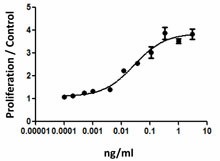- Regulatory Status
- RUO
- Other Names
- Granulocyte-Colony Stimulating Factor, CSF3, CSF-β

-

M-NSF-60 cell proliferation induced by human G-CSF.
| Cat # | Size | Price | Quantity Check Availability | ||
|---|---|---|---|---|---|
| 578602 | 10 µg | $218.00 | |||
| 578604 | 25 µg | $440.00 | |||
| 578606 | 100 µg | $1167.00 | |||
Human G-CSF was cloned from a human squamous carcinoma cell line and is the key hematopoietic cytokine involved in the control of neutrophil production. Therefore, it is a critical regulator of innate immunity against bacterial infections. G-CSF mobilizes stem cells indirectly by down-regulating the expression of CXCL12 on marrow osteoblasts and by releasing neutrophil and monocyte proteolytic enzymes, including neutrophil elastase, cathepsin G, and matrix metalloproteinase-9, which in turn degrade important HSC trafficking and adhesion molecules c-kit, VCAM-1, and CXCR4. In addition, G-CSF possesses immunosuppressive effects on monocytes/macrophages, dendritic cells, and T lymphocytes. The receptor for G-CSF is expressed not only in hematopoietic cells; it is also expressed in cardiomyocytes, skeletal muscle, and neurons. G-CSF influences mouse skeletal muscle development and regeneration by stimulating myoblast proliferation. In vitro, G-CSF displays strong antiapoptotic activity in neuronal cells.
Product Details
- Source
- Human G-CSF, amino acids Thr27-Pro200 (Accession# BC033245.1), was expressed in 293E cells.
- Molecular Mass
- The 174 amino acid recombinant protein has a predicted molecular mass of 18.6 kD. The DTT-reduced and the non-reduced proteins migrate at approximately 20 kD by SDS-PAGE. The N-terminal amino acid is Thr.
- Purity
- >95%, as determined by Coomassie stained SDS-PAGE.
- Formulation
- 0.22 µm filtered protein solution is in PBS.
- Endotoxin Level
- Less than 0.01 ng per µg cytokine as determined by the LAL method.
- Concentration
- 10 and 25 µg sizes are bottled at 200 µg/mL. 100 µg size and larger sizes are lot-specific and bottled at the concentration indicated on the vial. To obtain lot-specific concentration and expiration, please enter the lot number in our Certificate of Analysis online tool.
- Storage & Handling
- Unopened vial can be stored between 2°C and 8°C for up to 2 weeks, at -20°C for up to six months, or at -70°C or colder until the expiration date. For maximum results, quick spin vial prior to opening. The protein can be aliquoted and stored at -20°C or colder. Stock solutions can also be prepared at 50 - 100 µg/mL in appropriate sterile buffer, carrier protein such as 0.2 - 1% BSA or HSA can be added when preparing the stock solution. Aliquots can be stored between 2°C and 8°C for up to one week and stored at -20°C or colder for up to 3 months. Avoid repeated freeze/thaw cycles.
- Activity
- ED50 =0.02 - 0.08 ng/ml, corresponding to a specific activity of 1.25 - 5.0 x 107 units/mg, as determined by M-NFS60 cell proliferation induced by human G-CSF in a dose dependent manner.
- Application
-
Bioassay
- Application Notes
-
BioLegend carrier-free recombinant proteins provided in liquid format are shipped on blue-ice. Our comparison testing data indicates that when handled and stored as recommended, the liquid format has equal or better stability and shelf-life compared to commercially available lyophilized proteins after reconstitution. Our liquid proteins are verified in-house to maintain activity after shipping on blue ice and are backed by our 100% satisfaction guarantee. If you have any concerns, contact us at tech@biolegend.com.
- Product Citations
-
Antigen Details
- Structure
- Heterodimer
- Distribution
- Macrophages, monocytes, neutrophils, fibroblasts, endothelial cells, epithelial cells, and bone marrow stromal cells.
- Function
- G-CSF acts on myeloid progenitor cells to stimulate survival, proliferation, and neutrophilic maturation; on mature neutrophils, G-CSF enhances survival, superoxido anion and alkaline phosphatase production, arachidonic acid release, and antibody dependent cellular cytotoxicity.
- Interaction
- Hematopoietic progenitor cells, neutrophilic granulocytes, monocytes, platelets, endothelial cells, trophoblastic cells, myoblasts, cardiomyocytes, cardiac fibroblasts, neurons, and some small cell lung carcinoma cell lines.
- Ligand/Receptor
- CD114 (G-CSFR).
- Cell Type
- Hematopoietic stem and progenitors, Embryonic Stem Cells
- Biology Area
- Cell Biology, Immunology, Innate Immunity, Stem Cells
- Molecular Family
- Growth Factors, Cytokines/Chemokines
- Antigen References
-
1. Nagata S, et al. 1986. Nature 319:415.
2. Kim HK, et al. 2006. Blood 108:812.
3. Donahue RE, et al. 2009. Blood 114:2530.
4. Shimoji K, et al. 2010. Cell Stem Cell 6:227.
5. Martins A, et al. 2010. IUBMB Life 62:611.
6. Hara M, et al. 2011. J. Exp. Med. 208:715. - Gene ID
- 1441 View all products for this Gene ID
- UniProt
- View information about G-CSF on UniProt.org
